人教新课标必修三:Unit1 Festivals around the world课件-(81张ppt)
文档属性
| 名称 | 人教新课标必修三:Unit1 Festivals around the world课件-(81张ppt) |

|
|
| 格式 | pptx | ||
| 文件大小 | 1.0MB | ||
| 资源类型 | 教案 | ||
| 版本资源 | 人教版(新课程标准) | ||
| 科目 | 英语 | ||
| 更新时间 | 2022-02-28 21:56:22 | ||
图片预览

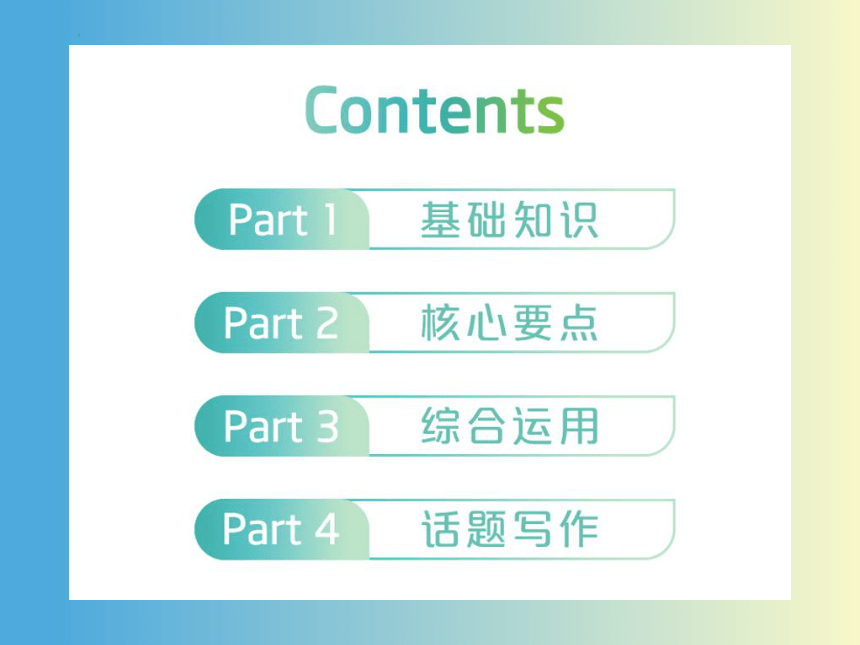
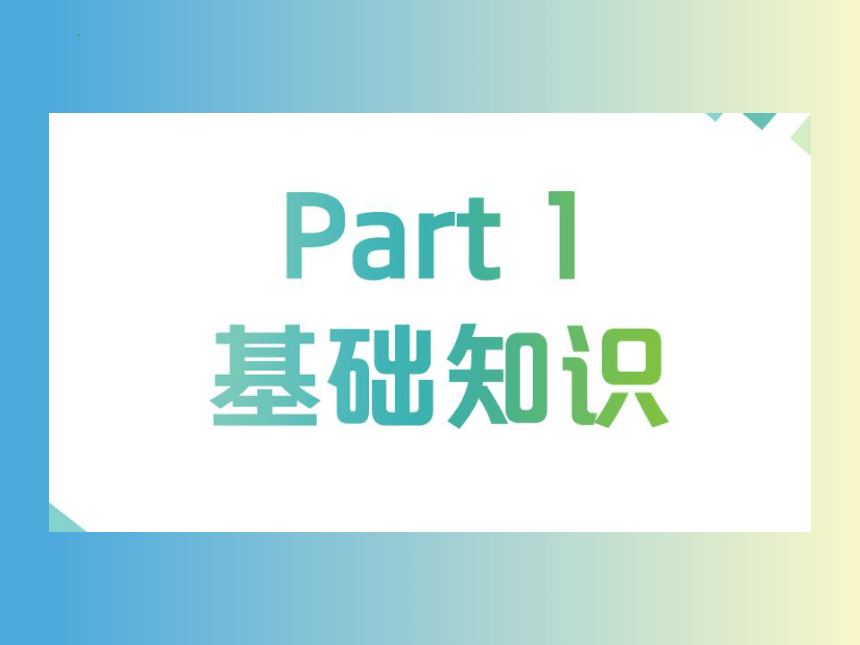
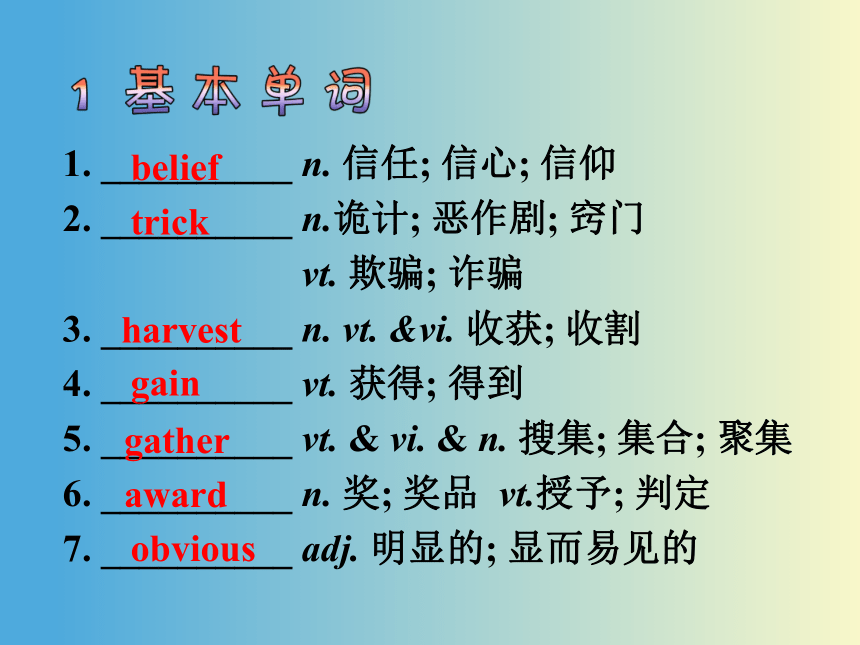
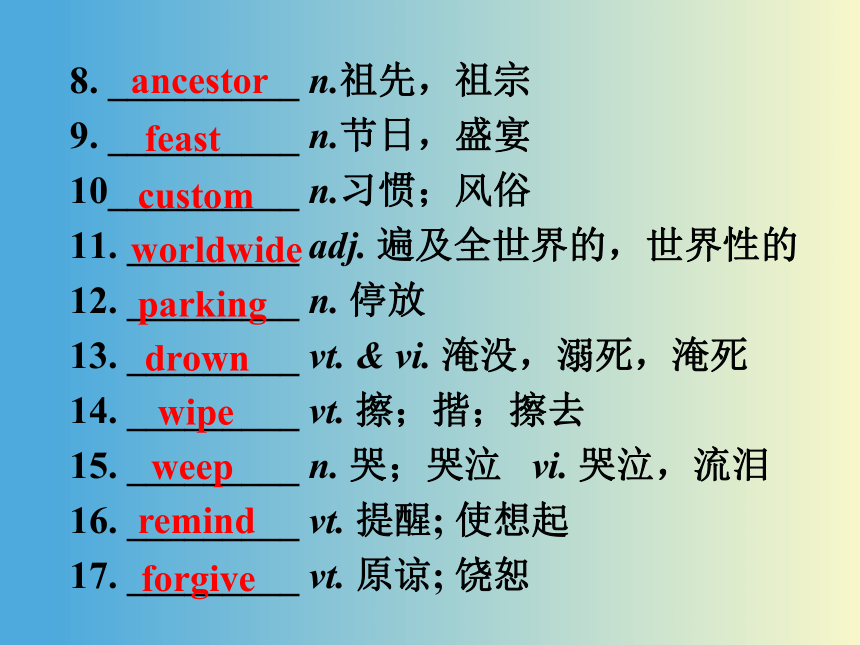
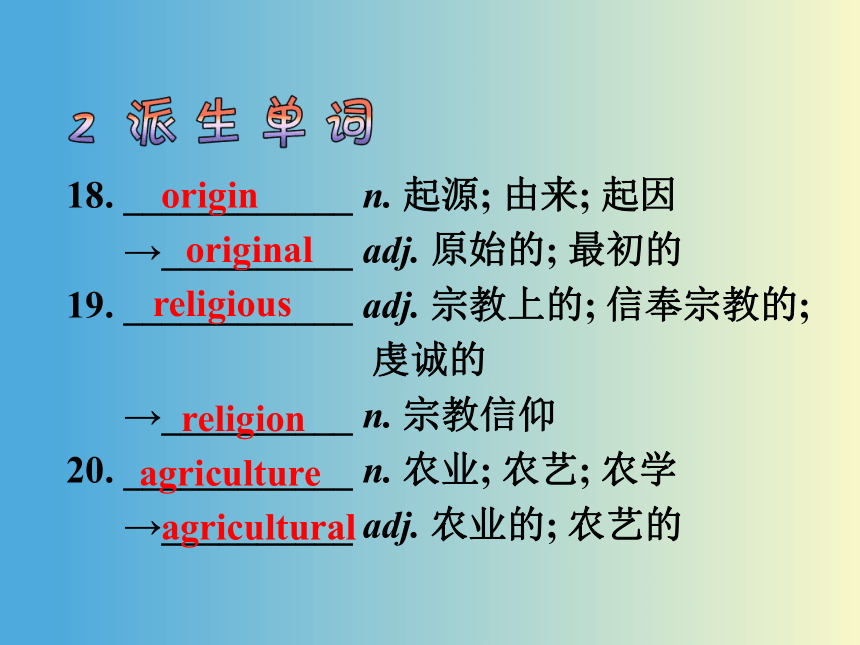
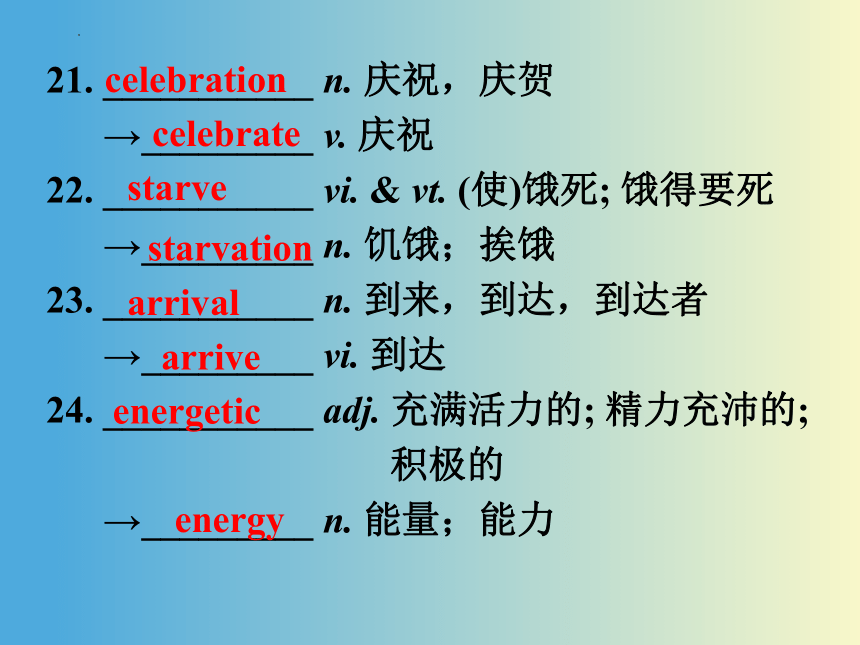
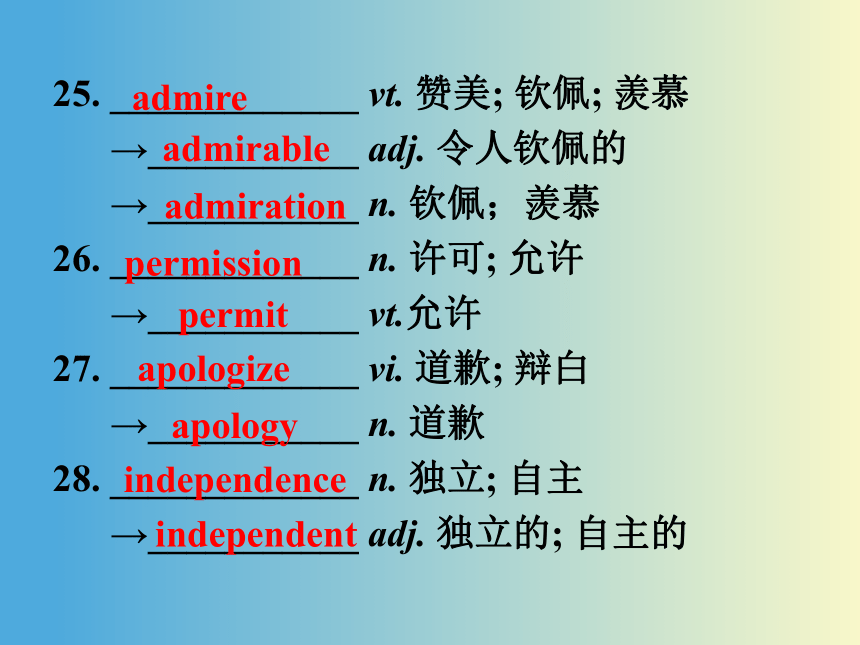

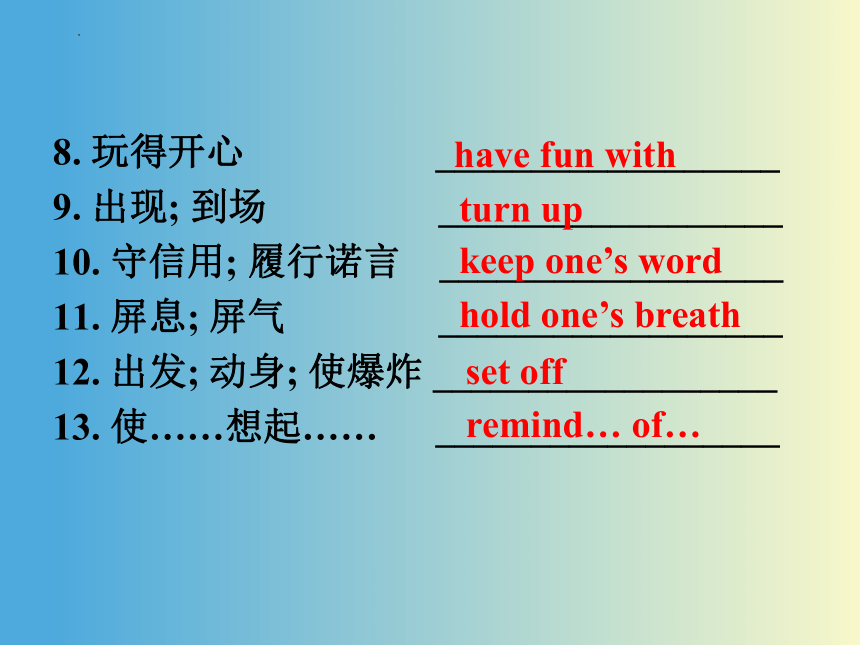
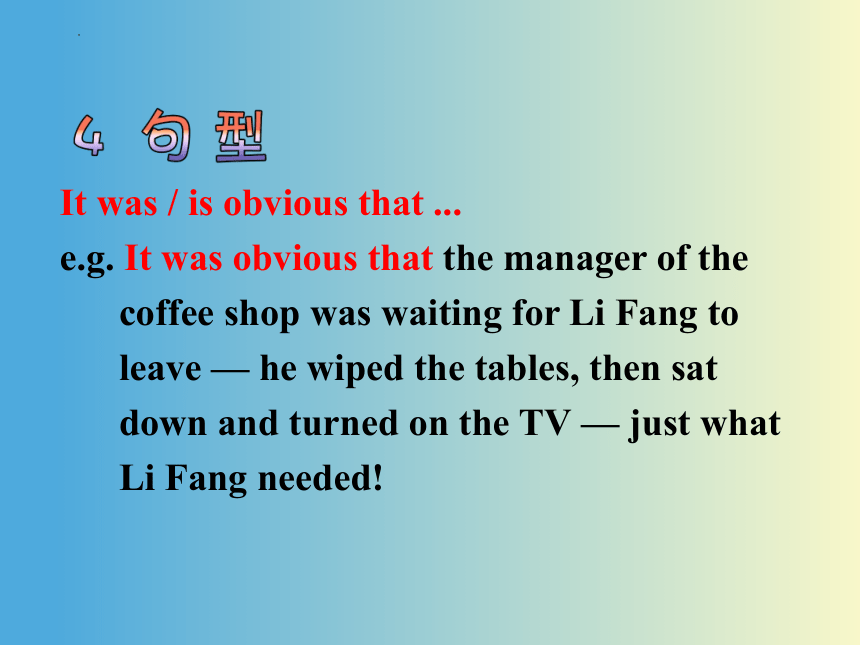

文档简介
(共81张PPT)
Unit 1
Festivals around the world
高一必修3
1. __________ n. 信任; 信心; 信仰
2. __________ n.诡计; 恶作剧; 窍门
vt. 欺骗; 诈骗
3. __________ n. vt. &vi. 收获; 收割
4. __________ vt. 获得; 得到
5. __________ vt. & vi. & n. 搜集; 集合; 聚集
6. __________ n. 奖; 奖品 vt.授予; 判定
7. __________ adj. 明显的; 显而易见的
belief
trick
harvest
gain
gather
award
obvious
8. __________ n.祖先,祖宗
9. __________ n.节日,盛宴
10__________ n.习惯;风俗
11. _________ adj. 遍及全世界的,世界性的
12. _________ n. 停放
13. _________ vt. & vi. 淹没,溺死,淹死
14. _________ vt. 擦;揩;擦去
15. _________ n. 哭;哭泣 vi. 哭泣,流泪
16. _________ vt. 提醒; 使想起
17. _________ vt. 原谅; 饶恕
ancestor
feast
custom
worldwide
parking
drown
wipe
remind
weep
forgive
18. ____________ n. 起源; 由来; 起因
→__________ adj. 原始的; 最初的
19. ____________ adj. 宗教上的; 信奉宗教的;
虔诚的
→__________ n. 宗教信仰
20. ____________ n. 农业; 农艺; 农学
→__________ adj. 农业的; 农艺的
origin
agriculture
agricultural
original
religious
religion
21. ___________ n. 庆祝,庆贺
→_________ v. 庆祝
22. ___________ vi. & vt. (使)饿死; 饿得要死
→_________ n. 饥饿;挨饿
23. ___________ n. 到来,到达,到达者
→_________ vi. 到达
24. ___________ adj. 充满活力的; 精力充沛的;
积极的
→_________ n. 能量;能力
starve
celebration
energetic
arrival
celebrate
starvation
arrive
energy
25. _____________ vt. 赞美; 钦佩; 羡慕
→___________ adj. 令人钦佩的
→___________ n. 钦佩;羡慕
26. _____________ n. 许可; 允许
→___________ vt.允许
27. _____________ vi. 道歉; 辩白
→___________ n. 道歉
28. _____________ n. 独立; 自主
→___________ adj. 独立的; 自主的
admire
admirable
admiration
permission
permit
apologize
apology
independence
independent
1. 发生 __________________
2. 纪念; 追念 __________________
3. 穿上盛装; 打扮; 装饰 __________________
4. 搞恶作剧;诈骗;开玩笑
__________________
5. 期望; 期待; 盼望 __________________
6. 日夜;昼夜;整天 __________________
7. 好像 __________________
take place
in memory of
dress up
look forward to
as though
play a trick on
day and night
8. 玩得开心 __________________
9. 出现; 到场 __________________
10. 守信用; 履行诺言 __________________
11. 屏息; 屏气 __________________
12. 出发; 动身; 使爆炸 __________________
13. 使……想起…… __________________
have fun with
turn up
keep one’s word
hold one’s breath
set off
remind… of…
It was / is obvious that ...
e.g. It was obvious that the manager of the coffee shop was waiting for Li Fang to leave — he wiped the tables, then sat down and turned on the TV — just what Li Fang needed!
1. -er常用于动词(最后一个字母为e常直接加r)后构成表“.……人”的名词
① hunt+er→hunter 猎人
② work+er→worker 工人
③ write+r→writer 作家
④ use+r→user 用户
⑤ teach+er→teacher 教师
2.“in+名词+of”构成介词短语
① in memory of 为了纪念……
② in honor of 为纪念/为庆祝……
③ in charge of 负责……
④ in support of 支持……
③ in case of 以防……
⑥ in need of 急需……
与节日相关的语块
a worldwide holiday 一个世界性的节日
the most energetic festival 最具有活力的节日
the origins of traditional festivals
传统节日的起源
celebrate the birth of ... 庆祝……的诞生
a special occasion for family celebration
家人欢聚庆祝的特殊时刻
different kinds of decorations
不同种类的装饰物
originate from ... 起源于……
Chinese customs 中国习俗
one’s animal year 本命年
traditional culture 传统文化
family reunion dinner 年夜饭
red envelope / money given to children as a lunar New Year gift 压岁钱
It marks the beginning / end of ...
它标志着……的开始 / 结束。
The ceremony of staying overnight to greet the New Year is observed during the eve when people listen to the toll of the New Year bell, setting off fireworks and firecrackers, events that are imbued with the implications of “ringing out the old and ringing in the new”, when theme of reunion is highlighted to the full.
除夕夜有守岁的习俗,聆听新年钟声,燃放烟花爆竹,有辞旧迎新的意味。除夕深刻地体现了春节的主题“团圆”。
1. starve vi.& vt. (使)饿死; 饿得要死; 渴望;
极需要
【教材原句】At that time people would starve if food was difficult to find, especially during the cold winter months. 在那个时代,如果食物难以找到,特别是寒冷的冬月,人们就会挨饿。
【归纳】
starve for sth. (急)需要…
starve to death 饿死
starve sb. into (doing) sth.
以饥饿迫使某人 (做)某事
【拓展】
be starved to death 饿死
starve for, ache for, die for, hunger for, long for, sigh for, thirst for
渴望得到......, 渴望做......
【语境应用】完成句子
1) ___________________________ if food doesn’t reach the city.
如果食物不能运到那座城市,许多人就要饿死。
2) They’ll either die from the cold or ________________.
他们要么会被冻死,要么会被饿死。
3) He is __________________.
他渴望得到关注。
Thousands of people will starve
starve to death
starving for attention
2. gain v. 获得; 得到 n. 利润; 利益
【教材原句】India has a national festival on October 2 to honour Mohandas Gandhi, the leader who helped gain India’s independence from Britain.
印度在10月2日有个全国性节日,纪念汉达斯·甘地,他是帮助印度脱离英国而独立的领袖。
【归纳】
gain from / by... 从……获益
gain two minutes (钟表)走快两分钟
gain one’s living 谋生
gain weight 体重增加
acquire 宾语多为知识/ 技能等;
earn 宾语多为金钱/ 荣誉等理应得到的东西;
obtain 宾语多为期望已久的东西;
gain 宾语多为经验/ 利益/ 优势/ 好处等;
win 宾语则为比赛/ 战斗等;
get 宾语较广泛, 既可是具体的东西, 也可是
抽象的事物。
acquire/ get/ gain/ earn/ obtain/ win
【语境应用】用acquire/ get/ gain/ earn/ win填空
After four years’ study, I ________ a good knowledge of computer and my perseverance ________ me many friends in the university. Therefore I ________ a good job, which has made me ________ much experience. And now I ________ up to $100, 000 a year.
经过四年的学习, 我获得了丰富的电脑知识。在大学里, 我的毅力为我赢得了很多朋友。因此, 我找到了一份好工作, 这项工作使我得到了很多的经验。现在, 我每年能够赚得10万美元。
acquired
won
got
gain
earn
单句改错
He gained excellent sums of money by acting.
通过表演, 他赚了不少钱。
分析:
表示“赚得, 赢得”, 而gain表示“通过努力而获得有利的东西”,这里赚钱用earn。
earned
3. award v. 授予,判定 n. 奖,奖品
【教材原句】Some people might win awards for their farm produce, like the biggest
watermelon or the most handsome rooster.
有些人还可能因为他们的农产品(参加
各种评选)而获奖,比如最大的西瓜或最帅
的公鸡。
【归纳】
v. award sb. sth. = award sth. to sb.
授予某人某物
n. receive/ win/ get an award for sth.
因……获奖
【语境应用】单句填空
1) Mr. White won / received _________(award) for his contribution to agricultural production.
2) Tony was _________(award) a medal for bravery.
awards
awarded
4. admire vt. 赞美; 钦佩; 羡慕
【教材原句】China and Japan have mid-autumn festivals, when people admire the moon and in China, enjoy mooncakes.
中国和日本都有中秋节,这时人们会赏月。在中国,人们还品尝月饼。
【归纳】
admire sb. for sth. 因某事而钦佩某人
【拓展】
admiration n. 赞美; 钦佩
express/ have admiration for sb./ sth.
(表示) 羡慕/ 钦佩某人/ 物
with/ in admiration 钦佩地
admirable adj. 可钦佩的; 极佳的
【语境应用】完成句子
The admirers _________(admire) the famous actor ________ his excellent performance, which they enjoy with/in __________ (admire), and because of having ___________(admire) for him, some of them even email him frequently.
这些羡慕者因这位著名演员的出色表演而钦佩他。他们带着钦佩之情欣赏他的表演。一些追求者因为钦佩他甚至经常给他发邮件。
admire
for
admiration
admiration
5. apologize vi. 道歉; 辩白
【教材原句】Well, he was not going to hold his breath for her to apologize.
他不想屏息等她来道歉。
【归纳】
apologize to sb. for (doing) sth.
因(做)某事向某人道歉
【拓展】
apology n. 道歉
make an apology to sb. for sth.
因某事向某人道歉
accept/refuse one’s apology
接受/拒绝某人的道歉
owe sb. an apology 应向某人道歉
【语境应用】汉译英
1) 我迟到了,必须向Tom道个歉。
I must apologize to Tom for my lateness.
单句填空
2) She finally received an _______ (apologize) from the company.
apology
6. remind vt. 提醒; 使想起
【教材原句】 I don’t want them to remind me of her.
他不想因它们想起她来。
【归纳】
remind sb. of sth. 提醒某人某事
remind sb. to do sth. 提醒某人做某事
remind (sb.) that/ how/ what…
提醒某人……
【语境应用】补全句子
1) You ________ ________ ________
________ ________ (使我想起了你的父亲)
when you say that.
2) Please ________ ________ ________
________ ________ ________ (提醒我寄
这封信) this afternoon.
remind me of
your father
remind me to
post the letter
3) She gently ________ ________ ________
(提醒他) the baby was getting cold and
should be taken indoors.
reminded him that
7. forgive (forgave, forgiven) vt.& vi. 原谅;饶恕
【教材原句】She would never forgive him.
她恐怕永远也不会原谅他了。
【归纳】
forgive sb. sth. 原谅某人某行为
forgive me 请原谅; 对不起
forgive one’s doing sth. 原谅某人做了某事
forgive sb. for (doing) sth.
原谅某人(做了)某事
forgive and forget 不念旧恶; 不记仇
【语境应用】完成句子
1) 她最后原谅了他忘了她的生日。
She _________________________ her birthday in the end.
2) 我们原谅了他的无礼。
We ________________________.
forgave him for forgetting
forgave him his rudeness
1. dress up ①(使)穿上盛装,精心打扮;②化装,装扮;③装饰;④添枝加叶地讲述
【教材原句】It is now a children’s festival, when they can dress up and go to their neighbour’s homes to ask for sweets. 万圣节如今成了孩子们的节日,这天他们可以乔装打扮上邻居家要糖吃。
【语境应用】写出dress up的汉语意思
1) She never dresses up, even when she goes to the opera. ___________
2) We dressed up for Halloween as pumpkins. __________
3) A fresh coat of paint will dress up the old bicycle very much. __________
4) Jerry dressed up the story of what he did on vacation and made it seem twice as interesting. ___________
添枝加叶地讲述
(使)穿上盛装,精心打扮
化装,装扮
装饰
2. look forward to 期望; 期待; 盼望
【教材原句】The most energetic and important festivals are the ones that look forward to the end of winter and to the coming of spring. 最富生气而又最重要的节日,就是告别冬天、迎来春天的日子。
【拓展】
look into sth. 调查某事
look down on/upon 瞧不起; 看不起
look on...as... 把……看作……
look over 检查
look through 浏览; 仔细查看
look out 当心; 小心
【拓展】介词to的短语:
pay attention to 注意
get down to 开始认真做某事
be / get used to 习惯于
refer to 谈到,查阅,指的是
stick to 坚持
lead to 导致,通往
【语境应用】完成句子。
1) 接下来一个月,我希望多点时间和我的朋友相处。
In the coming months, I ______________
__________________________________.
2) I am looking forward to _______ (meet) you next time.
look forward to
spending more time with my family
meeting
3. as though / if 好像
【教材原句】The country, covered with cherry tree flowers, look as though it is covered with pink snow. 整个国度到处是盛开的樱花,看上去就像覆盖了一层粉红色的雪。
【归纳】as though和as if均意为“好像,仿佛”。它们引导的从句中一般用虚拟语气:表示与现在事实相反,谓语用一般过去时(be的过去式用were);表示与过去事实相反,谓语用过去完成时。如果从句所述情况是事实或可能是事实,也可用陈述语气。
【语境应用】根据句意完成句子
You look ____________________________!
你看上去好像过得很不好!
2) It was John who broke the window. Why
are you talking to me as if I ________ (do) it
打破玻璃的是约翰,为什么你说的,好像
是我打破了玻璃一样?
as though you’ve had a bad time
had done
3) The child talks to us as if he __________(be)
a grown-up.
那个孩子跟我们谈起话来像个成年人似
的。
were
4. turn up 出现; 到场; 开大; 调高; 被发现
【教材原句】It was Valentine’s Day and Hu Jin had said she would meet him at the coffee shop after work. But she didn’t turn up.
这天是情人节,胡瑾说她下班后会在咖喱馆和他见面的。可现在她却不见人影。
【拓展】含turn的短语
turn on 打开
turn in 上交; 告发
turn out 结果是; 生产; 制造; 赶走
turn off 关掉
turn down 关小; 拒绝
turn to 转向; 求助于
turn over 翻转;移交
turn facts upside down 颠倒是非
turn for the better 好转
【语境应用】用turn短语的适当形式填空
1) Don’t worry. I’m sure your missing glasses will ________ sooner or later.
2) I don’t know who to _________.
3) I’m turning the project _________ to you.
4) The factory _________ 300 units a day.
5) Jake __________ his computer and checked his mail.
6) They’ve turned the gas ________ for a couple of hours.
turn up
turn to
turns out
turned on
off
over
5. keep one’s word 守信用; 履行诺言
【教材原句】She said she would be there at seven o’clock, and he thought she would keep her word.
她说她会在七点到达,他(李方)认为她会守信用的。
【拓展】含word短语及表达:
in other words 换句话说
in a word 总之; 简言之
break one’s word 失信, 食言
in words 用语言; 口头上
get in a word 插嘴
have a word with sb. 和某人说句话
key words 关键字
word comes that... 有消息传来……
(word意为消息时为不可数名词)
【语境应用】语法填空/单句改错/完成句子
1) How can we improve medical care to benefit people _____ other words, how can we create a health care system that helps people
2) Could I have word with you after the
meeting
3) He has _______________ (食言) so many times that I cannot trust him any more.
4) ______________ (有消息说) the world’s longest cross-sea bridge:Hong Kong-Zhuhai-Macao Bridge was completed as scheduled.
In
word前加a
broken his word
Word came that
6. hold one’s breath 屏息; 屏气
【教材原句】 Well, he was not going to hold his breath for her to apologize.
他不想屏息等她来道歉。
【拓展】含breath的短语
take a deep breath 深呼吸
lose one’s breath 喘不过气来
out of breath 气喘吁吁
catch one’s breath 恢复正常呼吸
【语境应用】完成句子
1) When we climbed to the top of the ten story building, we _________________ (上气不接下气).
2) If you run very fast, you must _______________ (喘不过气来).
were out of breath
lose your breath
It was obvious that the manager of the coffee shop was waiting for Li Fang to leave — he wiped the tables, then sat down and turned on the TV — just what Li Fang needed!
很明显,咖啡馆的经理在等李方离开,他擦了擦桌子,然后坐下来打开电视,这正是李方所需要的。
it作形式主语, 代指that引导的主语从句。
it作形式主语的常用句式:
① 句型“It was obvious that”可用obviously作评注性状语替换。
② 在句型“It be+形容词 (possible, strange, natural, important...)+that…”中,that从句常用虚拟语气,即从句谓语为“should+动词原形”,should可以省略。
【语境应用】完成句子
1) _________________ China will make a difference in the world today and tomorrow. 很明显,在今天的世界,甚至是以后的世界,中国将发挥它的影响力。
2) I think that ___________________ you should learn about the history of the Tang Dynasty before learning Tang poems.
我认为在学习唐诗之前你了解唐朝的历史是非常必要的。(2017 课标全国Ⅰ书面表达)
It is obvious that
it’s necessary that
一、may和might
都可表示允许。
e.g. You may/ might use my dictionary so long
as you return it before 17:00.
表示可能,might比may语气更不确定,表示的可能性更小。
e.g. Do you think Mr. Jackson may / might be
here on time
情态动词(一)
二、can和could
都可表示能力。
e.g. Even a small personal computer can store
great amounts of information.
I couldn’t get tickets; they were sold out.
可表示许可,could比can语气更委婉。
e.g. You can have my seat. I’m going now.
Could I have a drink of water, please
表示说话人的猜测,此时could不是can的过去式,表示推测的可能性比can小。
e.g. Can he still be alive after all this time
If you’re not careful, you could get into
even worse trouble.
三、will和would
表意愿,will表现在意愿,可用于条件句
中,would表示过去意愿(如表现在的意
愿,语气较委婉)。
e.g. Ask, if you will, who the owner is.
My friend asked if I would go with him.
都可表征求意见或提出请求。
e.g. Will/ Would you please make a cup of
coffee for me
都可表习惯和倾向性,will表现在的习惯,would表过去的习惯。
e.g. These clothes won’t wash easily.
When Ann was a child, she would often
ask some strange questions.
四、shall和should
shall在疑问句中用于征求对方意见,主要用于第一人称,也可用于第三人称,“要不要,……好吗”;在陈述句中表示说话者的允诺、告诫、威胁、命令、规定、必然性等,主要用于第二或第三人称。
e.g. Shall we go out and have a walk after dinner
Shall my sister come here now
You shall do as you see me do.
Tell Betty that she shall have the bike
tomorrow.
should表示义务或责任、建议或劝告、推断等。
e.g. We should take good care of our children.
You should give up smoking and
drinking.
With an early start the young men should
be here by 10:00 am.
五、must和can’t
must表示“必须做某事”,还可表推测。
e.g. All passengers must wear seat belts.
Your father has worked hard all day. He
must be tired.
When you got lost in the forest, you must
have been very frightened.
can’t表否定的推测和判断,“不可能”。
e.g. If Jim didn’t leave home until six o’clock,
he can’t be at the office yet.
Somebody must have opened the cage
because the lion can’t have escaped on its
own.
In today’s information age, the loss of data _________ cause serious problems for a company. (2018 北京)
It’s strange that he ________ have taken the books without the owner’s permission.
(2018 江苏)
can
should
3. Samuel, the tallest boy in our class, _______
easily reach the books on the top shelf.
(2017 北京)
can
Ⅰ. 课文语法填空。
There are all kinds of festivals throughout the world. Some festivals are held to honour the 1.__________ (die) or to satisfy the ancestors. For the Japanese festival Obon, people should go to clean graves and light incense 2.________ memory of their ancestors. Festivals can also 3.________ (hold) to honour famous people. India has a national festival on
October 2 4. _________ (honour) Mohandas Gandhi, the leader who helped gain India’s
be held
in
to honour
dead
5. ____________ (independent) from Britain.
And in China the Spring Festival, 6._______ is celebrated in January or February, is the
most 7._________ (energy) and important because it is a festival that 8.________(look) forward to the coming of spring. 9._________ the festivals, people love to get together to eat, drink and have fun with each other, 10.___________ (forget) our work for a little while.
which
looks
During
forgetting
independence
energetic
Ⅱ. 课文短文改错
Zhinü, who was the granddaughter of the
Goddess of Heaven, visited the earth secret.
While she was in the earth she met the herd
boy Niulang and they fall in love. When the
Goddess of Heaven knew that her
granddaughter married to a human,
on
fell
was
secretly
she became very angry and made the weaving
girl to return to Heaven. Found that Zhinü was
heart-broken, her grandmother final decided
to let the couple cross the Milky Way to meet
one a year. People in China hope that the
weather will be fine on that day,
Finding
finally
once
because whether it is raining, it means that
Zhinü was weeping and the couple won’t be
able to meet.
if
is
Ⅲ. 用本单元词汇和句式完成句子
1. 为纪念他的挚友,他写下了一首感人的长诗。
2. 最富有生气而又最重要的节日,就是告别冬天、迎来春天的日子。
He wrote a long moving poem in memory of his good friend.
The most energetic and important festivals are the ones that look forward to the end of the winter and to the coming of spring.
3. 听你的声音好像是感冒了。
4. 这张照片让我想起了童年。
5. 减少污染显而易见的办法就是少用汽车。
You sound as though / if you’ve caught a cold.
The picture reminds me of my childhood.
The obvious way of reducing pollution is to use cars less.
如何用英语写日记
【写作任务】
假设你是李华,今天你和同学们去购书时发现书店门口的共享单车乱停乱放,影响行人通行,于是你们主动把共享单车摆放整齐。请你用英语写一篇日记,将你们所做的好事记述下来。
注意:1. 词数100 左右;
2. 日记的格式已为你写好,但不计入总词数;
3. 可以适当增加细节,以使行文连贯。
Friday, January 3, 2020 Fine
_________________________________________________________________________
【写作指导】
一、审题定调
本写作任务要求写一篇日记,属于应用文。
日记通常由两部分组成,即书端和正文。书端专门用来记录日记的星期、日期和天气情况。通常,正文上方的左边(顶格)是星期和日期,右边是当天的天气情况。
日记的正文是日记的主要部分,本写作任务的正文属于叙事性记叙文。我们可以时间为线索,以事件发生的先后顺序来记叙,最后通过议论来说明自己的感受或从中得到的启示。
日记常用第一人称,当谈及其他对象时可根据实际情况采用相应的人称。由于记载的内容通常已经发生,故多用过去时态。
二、谋篇布局
本篇习作可分为两部分:
第一部分:描述事情发生的起因、经过和结果;
第二部分:说明自己的感受或从中得到的启示。
【范文展示】普通范文
Friday, January 3, 2020 Fine
This morning my classmates and I rode shared bikes to the Xinhua Bookstore to buy some books. Everyone was excited all the way, and we enjoyed the convenience of the shared bikes. However, what we saw at the gate of the bookstore made us awkward. The shared bikes were placed here and there and they blocked the way of passers-by. One of my classmates
suggested placing them in order, so we started
working at once.
When we saw the bikes in order, we all felt glad.
高级范文
Friday, January 3, 2020 Fine
This morning, I, as well as some of my
classmates, went to the Xinhua Bookstore to buy some books by shared bikes. Enjoying the
convenience brought about by the shared bikes,
everyone was excited all the way. However, a scene of disorder at the gate of the bookstore attracted our attention. The shared bikes were parked here and there, which blocked the way of passers-by. One of my classmates proposed placing them in order, so we got down to work immediately.
Seeing the tidily arranged bikes, we all felt
delighted.
Unit 1
Festivals around the world
高一必修3
1. __________ n. 信任; 信心; 信仰
2. __________ n.诡计; 恶作剧; 窍门
vt. 欺骗; 诈骗
3. __________ n. vt. &vi. 收获; 收割
4. __________ vt. 获得; 得到
5. __________ vt. & vi. & n. 搜集; 集合; 聚集
6. __________ n. 奖; 奖品 vt.授予; 判定
7. __________ adj. 明显的; 显而易见的
belief
trick
harvest
gain
gather
award
obvious
8. __________ n.祖先,祖宗
9. __________ n.节日,盛宴
10__________ n.习惯;风俗
11. _________ adj. 遍及全世界的,世界性的
12. _________ n. 停放
13. _________ vt. & vi. 淹没,溺死,淹死
14. _________ vt. 擦;揩;擦去
15. _________ n. 哭;哭泣 vi. 哭泣,流泪
16. _________ vt. 提醒; 使想起
17. _________ vt. 原谅; 饶恕
ancestor
feast
custom
worldwide
parking
drown
wipe
remind
weep
forgive
18. ____________ n. 起源; 由来; 起因
→__________ adj. 原始的; 最初的
19. ____________ adj. 宗教上的; 信奉宗教的;
虔诚的
→__________ n. 宗教信仰
20. ____________ n. 农业; 农艺; 农学
→__________ adj. 农业的; 农艺的
origin
agriculture
agricultural
original
religious
religion
21. ___________ n. 庆祝,庆贺
→_________ v. 庆祝
22. ___________ vi. & vt. (使)饿死; 饿得要死
→_________ n. 饥饿;挨饿
23. ___________ n. 到来,到达,到达者
→_________ vi. 到达
24. ___________ adj. 充满活力的; 精力充沛的;
积极的
→_________ n. 能量;能力
starve
celebration
energetic
arrival
celebrate
starvation
arrive
energy
25. _____________ vt. 赞美; 钦佩; 羡慕
→___________ adj. 令人钦佩的
→___________ n. 钦佩;羡慕
26. _____________ n. 许可; 允许
→___________ vt.允许
27. _____________ vi. 道歉; 辩白
→___________ n. 道歉
28. _____________ n. 独立; 自主
→___________ adj. 独立的; 自主的
admire
admirable
admiration
permission
permit
apologize
apology
independence
independent
1. 发生 __________________
2. 纪念; 追念 __________________
3. 穿上盛装; 打扮; 装饰 __________________
4. 搞恶作剧;诈骗;开玩笑
__________________
5. 期望; 期待; 盼望 __________________
6. 日夜;昼夜;整天 __________________
7. 好像 __________________
take place
in memory of
dress up
look forward to
as though
play a trick on
day and night
8. 玩得开心 __________________
9. 出现; 到场 __________________
10. 守信用; 履行诺言 __________________
11. 屏息; 屏气 __________________
12. 出发; 动身; 使爆炸 __________________
13. 使……想起…… __________________
have fun with
turn up
keep one’s word
hold one’s breath
set off
remind… of…
It was / is obvious that ...
e.g. It was obvious that the manager of the coffee shop was waiting for Li Fang to leave — he wiped the tables, then sat down and turned on the TV — just what Li Fang needed!
1. -er常用于动词(最后一个字母为e常直接加r)后构成表“.……人”的名词
① hunt+er→hunter 猎人
② work+er→worker 工人
③ write+r→writer 作家
④ use+r→user 用户
⑤ teach+er→teacher 教师
2.“in+名词+of”构成介词短语
① in memory of 为了纪念……
② in honor of 为纪念/为庆祝……
③ in charge of 负责……
④ in support of 支持……
③ in case of 以防……
⑥ in need of 急需……
与节日相关的语块
a worldwide holiday 一个世界性的节日
the most energetic festival 最具有活力的节日
the origins of traditional festivals
传统节日的起源
celebrate the birth of ... 庆祝……的诞生
a special occasion for family celebration
家人欢聚庆祝的特殊时刻
different kinds of decorations
不同种类的装饰物
originate from ... 起源于……
Chinese customs 中国习俗
one’s animal year 本命年
traditional culture 传统文化
family reunion dinner 年夜饭
red envelope / money given to children as a lunar New Year gift 压岁钱
It marks the beginning / end of ...
它标志着……的开始 / 结束。
The ceremony of staying overnight to greet the New Year is observed during the eve when people listen to the toll of the New Year bell, setting off fireworks and firecrackers, events that are imbued with the implications of “ringing out the old and ringing in the new”, when theme of reunion is highlighted to the full.
除夕夜有守岁的习俗,聆听新年钟声,燃放烟花爆竹,有辞旧迎新的意味。除夕深刻地体现了春节的主题“团圆”。
1. starve vi.& vt. (使)饿死; 饿得要死; 渴望;
极需要
【教材原句】At that time people would starve if food was difficult to find, especially during the cold winter months. 在那个时代,如果食物难以找到,特别是寒冷的冬月,人们就会挨饿。
【归纳】
starve for sth. (急)需要…
starve to death 饿死
starve sb. into (doing) sth.
以饥饿迫使某人 (做)某事
【拓展】
be starved to death 饿死
starve for, ache for, die for, hunger for, long for, sigh for, thirst for
渴望得到......, 渴望做......
【语境应用】完成句子
1) ___________________________ if food doesn’t reach the city.
如果食物不能运到那座城市,许多人就要饿死。
2) They’ll either die from the cold or ________________.
他们要么会被冻死,要么会被饿死。
3) He is __________________.
他渴望得到关注。
Thousands of people will starve
starve to death
starving for attention
2. gain v. 获得; 得到 n. 利润; 利益
【教材原句】India has a national festival on October 2 to honour Mohandas Gandhi, the leader who helped gain India’s independence from Britain.
印度在10月2日有个全国性节日,纪念汉达斯·甘地,他是帮助印度脱离英国而独立的领袖。
【归纳】
gain from / by... 从……获益
gain two minutes (钟表)走快两分钟
gain one’s living 谋生
gain weight 体重增加
acquire 宾语多为知识/ 技能等;
earn 宾语多为金钱/ 荣誉等理应得到的东西;
obtain 宾语多为期望已久的东西;
gain 宾语多为经验/ 利益/ 优势/ 好处等;
win 宾语则为比赛/ 战斗等;
get 宾语较广泛, 既可是具体的东西, 也可是
抽象的事物。
acquire/ get/ gain/ earn/ obtain/ win
【语境应用】用acquire/ get/ gain/ earn/ win填空
After four years’ study, I ________ a good knowledge of computer and my perseverance ________ me many friends in the university. Therefore I ________ a good job, which has made me ________ much experience. And now I ________ up to $100, 000 a year.
经过四年的学习, 我获得了丰富的电脑知识。在大学里, 我的毅力为我赢得了很多朋友。因此, 我找到了一份好工作, 这项工作使我得到了很多的经验。现在, 我每年能够赚得10万美元。
acquired
won
got
gain
earn
单句改错
He gained excellent sums of money by acting.
通过表演, 他赚了不少钱。
分析:
表示“赚得, 赢得”, 而gain表示“通过努力而获得有利的东西”,这里赚钱用earn。
earned
3. award v. 授予,判定 n. 奖,奖品
【教材原句】Some people might win awards for their farm produce, like the biggest
watermelon or the most handsome rooster.
有些人还可能因为他们的农产品(参加
各种评选)而获奖,比如最大的西瓜或最帅
的公鸡。
【归纳】
v. award sb. sth. = award sth. to sb.
授予某人某物
n. receive/ win/ get an award for sth.
因……获奖
【语境应用】单句填空
1) Mr. White won / received _________(award) for his contribution to agricultural production.
2) Tony was _________(award) a medal for bravery.
awards
awarded
4. admire vt. 赞美; 钦佩; 羡慕
【教材原句】China and Japan have mid-autumn festivals, when people admire the moon and in China, enjoy mooncakes.
中国和日本都有中秋节,这时人们会赏月。在中国,人们还品尝月饼。
【归纳】
admire sb. for sth. 因某事而钦佩某人
【拓展】
admiration n. 赞美; 钦佩
express/ have admiration for sb./ sth.
(表示) 羡慕/ 钦佩某人/ 物
with/ in admiration 钦佩地
admirable adj. 可钦佩的; 极佳的
【语境应用】完成句子
The admirers _________(admire) the famous actor ________ his excellent performance, which they enjoy with/in __________ (admire), and because of having ___________(admire) for him, some of them even email him frequently.
这些羡慕者因这位著名演员的出色表演而钦佩他。他们带着钦佩之情欣赏他的表演。一些追求者因为钦佩他甚至经常给他发邮件。
admire
for
admiration
admiration
5. apologize vi. 道歉; 辩白
【教材原句】Well, he was not going to hold his breath for her to apologize.
他不想屏息等她来道歉。
【归纳】
apologize to sb. for (doing) sth.
因(做)某事向某人道歉
【拓展】
apology n. 道歉
make an apology to sb. for sth.
因某事向某人道歉
accept/refuse one’s apology
接受/拒绝某人的道歉
owe sb. an apology 应向某人道歉
【语境应用】汉译英
1) 我迟到了,必须向Tom道个歉。
I must apologize to Tom for my lateness.
单句填空
2) She finally received an _______ (apologize) from the company.
apology
6. remind vt. 提醒; 使想起
【教材原句】 I don’t want them to remind me of her.
他不想因它们想起她来。
【归纳】
remind sb. of sth. 提醒某人某事
remind sb. to do sth. 提醒某人做某事
remind (sb.) that/ how/ what…
提醒某人……
【语境应用】补全句子
1) You ________ ________ ________
________ ________ (使我想起了你的父亲)
when you say that.
2) Please ________ ________ ________
________ ________ ________ (提醒我寄
这封信) this afternoon.
remind me of
your father
remind me to
post the letter
3) She gently ________ ________ ________
(提醒他) the baby was getting cold and
should be taken indoors.
reminded him that
7. forgive (forgave, forgiven) vt.& vi. 原谅;饶恕
【教材原句】She would never forgive him.
她恐怕永远也不会原谅他了。
【归纳】
forgive sb. sth. 原谅某人某行为
forgive me 请原谅; 对不起
forgive one’s doing sth. 原谅某人做了某事
forgive sb. for (doing) sth.
原谅某人(做了)某事
forgive and forget 不念旧恶; 不记仇
【语境应用】完成句子
1) 她最后原谅了他忘了她的生日。
She _________________________ her birthday in the end.
2) 我们原谅了他的无礼。
We ________________________.
forgave him for forgetting
forgave him his rudeness
1. dress up ①(使)穿上盛装,精心打扮;②化装,装扮;③装饰;④添枝加叶地讲述
【教材原句】It is now a children’s festival, when they can dress up and go to their neighbour’s homes to ask for sweets. 万圣节如今成了孩子们的节日,这天他们可以乔装打扮上邻居家要糖吃。
【语境应用】写出dress up的汉语意思
1) She never dresses up, even when she goes to the opera. ___________
2) We dressed up for Halloween as pumpkins. __________
3) A fresh coat of paint will dress up the old bicycle very much. __________
4) Jerry dressed up the story of what he did on vacation and made it seem twice as interesting. ___________
添枝加叶地讲述
(使)穿上盛装,精心打扮
化装,装扮
装饰
2. look forward to 期望; 期待; 盼望
【教材原句】The most energetic and important festivals are the ones that look forward to the end of winter and to the coming of spring. 最富生气而又最重要的节日,就是告别冬天、迎来春天的日子。
【拓展】
look into sth. 调查某事
look down on/upon 瞧不起; 看不起
look on...as... 把……看作……
look over 检查
look through 浏览; 仔细查看
look out 当心; 小心
【拓展】介词to的短语:
pay attention to 注意
get down to 开始认真做某事
be / get used to 习惯于
refer to 谈到,查阅,指的是
stick to 坚持
lead to 导致,通往
【语境应用】完成句子。
1) 接下来一个月,我希望多点时间和我的朋友相处。
In the coming months, I ______________
__________________________________.
2) I am looking forward to _______ (meet) you next time.
look forward to
spending more time with my family
meeting
3. as though / if 好像
【教材原句】The country, covered with cherry tree flowers, look as though it is covered with pink snow. 整个国度到处是盛开的樱花,看上去就像覆盖了一层粉红色的雪。
【归纳】as though和as if均意为“好像,仿佛”。它们引导的从句中一般用虚拟语气:表示与现在事实相反,谓语用一般过去时(be的过去式用were);表示与过去事实相反,谓语用过去完成时。如果从句所述情况是事实或可能是事实,也可用陈述语气。
【语境应用】根据句意完成句子
You look ____________________________!
你看上去好像过得很不好!
2) It was John who broke the window. Why
are you talking to me as if I ________ (do) it
打破玻璃的是约翰,为什么你说的,好像
是我打破了玻璃一样?
as though you’ve had a bad time
had done
3) The child talks to us as if he __________(be)
a grown-up.
那个孩子跟我们谈起话来像个成年人似
的。
were
4. turn up 出现; 到场; 开大; 调高; 被发现
【教材原句】It was Valentine’s Day and Hu Jin had said she would meet him at the coffee shop after work. But she didn’t turn up.
这天是情人节,胡瑾说她下班后会在咖喱馆和他见面的。可现在她却不见人影。
【拓展】含turn的短语
turn on 打开
turn in 上交; 告发
turn out 结果是; 生产; 制造; 赶走
turn off 关掉
turn down 关小; 拒绝
turn to 转向; 求助于
turn over 翻转;移交
turn facts upside down 颠倒是非
turn for the better 好转
【语境应用】用turn短语的适当形式填空
1) Don’t worry. I’m sure your missing glasses will ________ sooner or later.
2) I don’t know who to _________.
3) I’m turning the project _________ to you.
4) The factory _________ 300 units a day.
5) Jake __________ his computer and checked his mail.
6) They’ve turned the gas ________ for a couple of hours.
turn up
turn to
turns out
turned on
off
over
5. keep one’s word 守信用; 履行诺言
【教材原句】She said she would be there at seven o’clock, and he thought she would keep her word.
她说她会在七点到达,他(李方)认为她会守信用的。
【拓展】含word短语及表达:
in other words 换句话说
in a word 总之; 简言之
break one’s word 失信, 食言
in words 用语言; 口头上
get in a word 插嘴
have a word with sb. 和某人说句话
key words 关键字
word comes that... 有消息传来……
(word意为消息时为不可数名词)
【语境应用】语法填空/单句改错/完成句子
1) How can we improve medical care to benefit people _____ other words, how can we create a health care system that helps people
2) Could I have word with you after the
meeting
3) He has _______________ (食言) so many times that I cannot trust him any more.
4) ______________ (有消息说) the world’s longest cross-sea bridge:Hong Kong-Zhuhai-Macao Bridge was completed as scheduled.
In
word前加a
broken his word
Word came that
6. hold one’s breath 屏息; 屏气
【教材原句】 Well, he was not going to hold his breath for her to apologize.
他不想屏息等她来道歉。
【拓展】含breath的短语
take a deep breath 深呼吸
lose one’s breath 喘不过气来
out of breath 气喘吁吁
catch one’s breath 恢复正常呼吸
【语境应用】完成句子
1) When we climbed to the top of the ten story building, we _________________ (上气不接下气).
2) If you run very fast, you must _______________ (喘不过气来).
were out of breath
lose your breath
It was obvious that the manager of the coffee shop was waiting for Li Fang to leave — he wiped the tables, then sat down and turned on the TV — just what Li Fang needed!
很明显,咖啡馆的经理在等李方离开,他擦了擦桌子,然后坐下来打开电视,这正是李方所需要的。
it作形式主语, 代指that引导的主语从句。
it作形式主语的常用句式:
① 句型“It was obvious that”可用obviously作评注性状语替换。
② 在句型“It be+形容词 (possible, strange, natural, important...)+that…”中,that从句常用虚拟语气,即从句谓语为“should+动词原形”,should可以省略。
【语境应用】完成句子
1) _________________ China will make a difference in the world today and tomorrow. 很明显,在今天的世界,甚至是以后的世界,中国将发挥它的影响力。
2) I think that ___________________ you should learn about the history of the Tang Dynasty before learning Tang poems.
我认为在学习唐诗之前你了解唐朝的历史是非常必要的。(2017 课标全国Ⅰ书面表达)
It is obvious that
it’s necessary that
一、may和might
都可表示允许。
e.g. You may/ might use my dictionary so long
as you return it before 17:00.
表示可能,might比may语气更不确定,表示的可能性更小。
e.g. Do you think Mr. Jackson may / might be
here on time
情态动词(一)
二、can和could
都可表示能力。
e.g. Even a small personal computer can store
great amounts of information.
I couldn’t get tickets; they were sold out.
可表示许可,could比can语气更委婉。
e.g. You can have my seat. I’m going now.
Could I have a drink of water, please
表示说话人的猜测,此时could不是can的过去式,表示推测的可能性比can小。
e.g. Can he still be alive after all this time
If you’re not careful, you could get into
even worse trouble.
三、will和would
表意愿,will表现在意愿,可用于条件句
中,would表示过去意愿(如表现在的意
愿,语气较委婉)。
e.g. Ask, if you will, who the owner is.
My friend asked if I would go with him.
都可表征求意见或提出请求。
e.g. Will/ Would you please make a cup of
coffee for me
都可表习惯和倾向性,will表现在的习惯,would表过去的习惯。
e.g. These clothes won’t wash easily.
When Ann was a child, she would often
ask some strange questions.
四、shall和should
shall在疑问句中用于征求对方意见,主要用于第一人称,也可用于第三人称,“要不要,……好吗”;在陈述句中表示说话者的允诺、告诫、威胁、命令、规定、必然性等,主要用于第二或第三人称。
e.g. Shall we go out and have a walk after dinner
Shall my sister come here now
You shall do as you see me do.
Tell Betty that she shall have the bike
tomorrow.
should表示义务或责任、建议或劝告、推断等。
e.g. We should take good care of our children.
You should give up smoking and
drinking.
With an early start the young men should
be here by 10:00 am.
五、must和can’t
must表示“必须做某事”,还可表推测。
e.g. All passengers must wear seat belts.
Your father has worked hard all day. He
must be tired.
When you got lost in the forest, you must
have been very frightened.
can’t表否定的推测和判断,“不可能”。
e.g. If Jim didn’t leave home until six o’clock,
he can’t be at the office yet.
Somebody must have opened the cage
because the lion can’t have escaped on its
own.
In today’s information age, the loss of data _________ cause serious problems for a company. (2018 北京)
It’s strange that he ________ have taken the books without the owner’s permission.
(2018 江苏)
can
should
3. Samuel, the tallest boy in our class, _______
easily reach the books on the top shelf.
(2017 北京)
can
Ⅰ. 课文语法填空。
There are all kinds of festivals throughout the world. Some festivals are held to honour the 1.__________ (die) or to satisfy the ancestors. For the Japanese festival Obon, people should go to clean graves and light incense 2.________ memory of their ancestors. Festivals can also 3.________ (hold) to honour famous people. India has a national festival on
October 2 4. _________ (honour) Mohandas Gandhi, the leader who helped gain India’s
be held
in
to honour
dead
5. ____________ (independent) from Britain.
And in China the Spring Festival, 6._______ is celebrated in January or February, is the
most 7._________ (energy) and important because it is a festival that 8.________(look) forward to the coming of spring. 9._________ the festivals, people love to get together to eat, drink and have fun with each other, 10.___________ (forget) our work for a little while.
which
looks
During
forgetting
independence
energetic
Ⅱ. 课文短文改错
Zhinü, who was the granddaughter of the
Goddess of Heaven, visited the earth secret.
While she was in the earth she met the herd
boy Niulang and they fall in love. When the
Goddess of Heaven knew that her
granddaughter married to a human,
on
fell
was
secretly
she became very angry and made the weaving
girl to return to Heaven. Found that Zhinü was
heart-broken, her grandmother final decided
to let the couple cross the Milky Way to meet
one a year. People in China hope that the
weather will be fine on that day,
Finding
finally
once
because whether it is raining, it means that
Zhinü was weeping and the couple won’t be
able to meet.
if
is
Ⅲ. 用本单元词汇和句式完成句子
1. 为纪念他的挚友,他写下了一首感人的长诗。
2. 最富有生气而又最重要的节日,就是告别冬天、迎来春天的日子。
He wrote a long moving poem in memory of his good friend.
The most energetic and important festivals are the ones that look forward to the end of the winter and to the coming of spring.
3. 听你的声音好像是感冒了。
4. 这张照片让我想起了童年。
5. 减少污染显而易见的办法就是少用汽车。
You sound as though / if you’ve caught a cold.
The picture reminds me of my childhood.
The obvious way of reducing pollution is to use cars less.
如何用英语写日记
【写作任务】
假设你是李华,今天你和同学们去购书时发现书店门口的共享单车乱停乱放,影响行人通行,于是你们主动把共享单车摆放整齐。请你用英语写一篇日记,将你们所做的好事记述下来。
注意:1. 词数100 左右;
2. 日记的格式已为你写好,但不计入总词数;
3. 可以适当增加细节,以使行文连贯。
Friday, January 3, 2020 Fine
_________________________________________________________________________
【写作指导】
一、审题定调
本写作任务要求写一篇日记,属于应用文。
日记通常由两部分组成,即书端和正文。书端专门用来记录日记的星期、日期和天气情况。通常,正文上方的左边(顶格)是星期和日期,右边是当天的天气情况。
日记的正文是日记的主要部分,本写作任务的正文属于叙事性记叙文。我们可以时间为线索,以事件发生的先后顺序来记叙,最后通过议论来说明自己的感受或从中得到的启示。
日记常用第一人称,当谈及其他对象时可根据实际情况采用相应的人称。由于记载的内容通常已经发生,故多用过去时态。
二、谋篇布局
本篇习作可分为两部分:
第一部分:描述事情发生的起因、经过和结果;
第二部分:说明自己的感受或从中得到的启示。
【范文展示】普通范文
Friday, January 3, 2020 Fine
This morning my classmates and I rode shared bikes to the Xinhua Bookstore to buy some books. Everyone was excited all the way, and we enjoyed the convenience of the shared bikes. However, what we saw at the gate of the bookstore made us awkward. The shared bikes were placed here and there and they blocked the way of passers-by. One of my classmates
suggested placing them in order, so we started
working at once.
When we saw the bikes in order, we all felt glad.
高级范文
Friday, January 3, 2020 Fine
This morning, I, as well as some of my
classmates, went to the Xinhua Bookstore to buy some books by shared bikes. Enjoying the
convenience brought about by the shared bikes,
everyone was excited all the way. However, a scene of disorder at the gate of the bookstore attracted our attention. The shared bikes were parked here and there, which blocked the way of passers-by. One of my classmates proposed placing them in order, so we got down to work immediately.
Seeing the tidily arranged bikes, we all felt
delighted.
同课章节目录
